Film of the Week: Godard Mon Amour
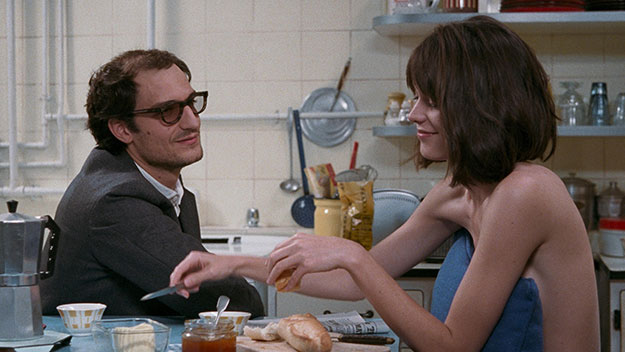
Context being everything, I know exactly why I liked Godard Mon Amour a year ago, when it premiered in Cannes: it was because I was convinced I was going to hate it. A film about Jean-Luc Godard and Anne Wiazemsky from the director of The Artist, with teaser stills of Louis Garrel with his hair cropped and tufted to look like the balding mid-’60s JLG—this wasn’t a promising prospect. But if a film confounds your expectations positively, it tends to earn major bonus points. So this time last year, I liked Michel Hazanavicius’s film a lot, with reservations. Now, on a second viewing, my response is more along the lines of, “Ouais bof…” (to be pronounced with a Gallic shrug of not outright dismissal but, let’s say, perplexed impatience).
Godard Mon Amour, it must be said first of all, is a really stupid U.S. release title—although the poster is emblazoned with Godard’s own opinion, stated in 2016 before the project was complete, that the film was “a stupid, stupid idea.” What’s charming about Godard Mon Amour—originally titled Le Redoutable, after a French submarine much discussed in the mid-’60s—is that it revels in its own stupidity. But the knowing faux-dumbness is mixed with no small degree of simple misjudgment.
The film recounts a period in the lives of Jean-Luc Godard and the woman who was his wife for 12 years: young actress Anne Wiazemsky. She had appeared in Robert Bresson’s Au hasard Balthazar, before marrying Godard. Godard cast Wiazemsky—who died last October, just as the film was being launched on the post-Cannes festival circuit—in a lead role in his cogitation on Maoist politics La Chinoise, and continued working with her in several other films; they divorced in 1979. Wiazemsky, who also worked with directors including Marco Ferreri and Pasolini, went on to achieve renown as a novelist. She also wrote memoirs about her time with Godard. Hazanavicius’s film is based specifically on her Un an après (One Year Later, 2015) but also draws on Une année studieuse (A Studious Year, 2011), her account of being swept off her feet by a charismatic and impetuous older man (she was 19, he was in his mid-30s and enjoying a period of profligacy with sports cars and upmarket holiday retreats).
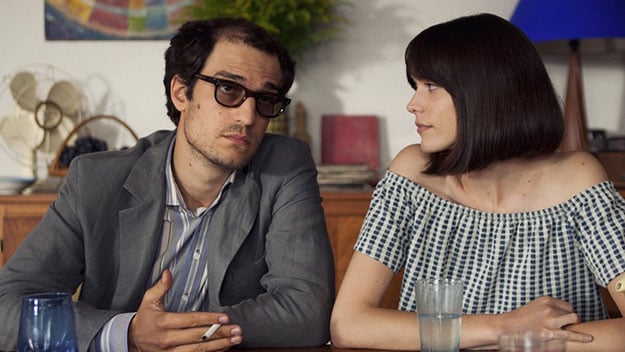
Godard Mon Amour shows the director, and the marriage, coming apart at the seams: it basically recounts 1968 and the effect of that year’s political upheavals in France. As Anne, played by Stacy Martin, puts it in her opening voiceover, he had revolutionized cinema, “now he was about to revolutionize himself.” The film’s suggestion is that Godard wasn’t revolutionizing himself for the better—that he was undergoing more of a breakdown than a revolution.
Divided into several chapters, with jokey titles that don’t really survive translation, the film begins with Jean-Luc enjoying his prime. Anne’s voiceover: “The future belonged to him. He was respected worldwide—adored by Jean Renoir as well as the Beatles . . . He was the Nouvelle Vague . . . a certain idea of cinema—indefinable, wild, fascinating… and I loved him.” You can only assume that Hazanavicius is sending up such hyperventilating corniness, but you can’t be sure. The couple are in love, their passion betokened by several sequences showing Martin lying naked as the camera drifts admiringly over her body; yes, there’s a nod to the prelude to Contempt, but Godard Mon Amour gives us a lot more of Martin’s body than that film gave us of Bardot’s. There’s also a lovemaking sequence in black and white, done in a succession of single shots that suggest a ’60s French erotic strip, including close-ups of Anne’s mouth during orgasm and her hand clenching on a white bedsheet. At moments, you have to remind yourself that this isn’t Roger Vadim Mon Amour.
So we begin in 1967, and JLG is still enjoying some joie de vivre—off to the movies with Anne, and necking all the way through It’s Always Fair Weather. But he’s getting nervous about the future, and his age. “Mozart died at 35 and he was right . . . In a few months, I’ll turn 37.” The future, he’s convinced, is politics and what he can do with it in his work: he’s cast Anne in La Chinoise and promises her, a little anachronistically, “You’ll become a revolutionary icon.”
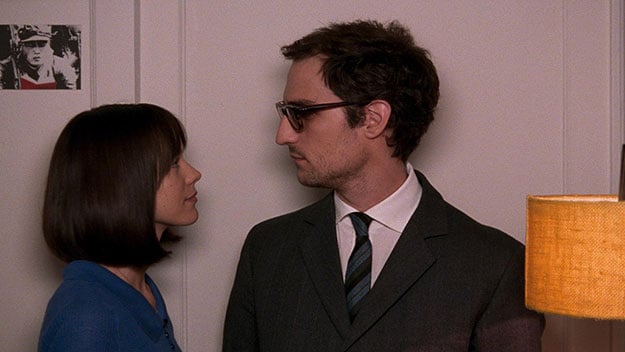
Then things go wrong. No one much likes La Chinoise—and while Jean-Luc is not so bothered what the bourgeois French press make of it, he’s galled to learn that the Chinese government, which he hoped to impress, denounces it “the work of a reactionary imbecile.” Jean-Luc really starts falling apart when France is swept up in a surge of revolutionary fervor from the young Left: the film presents, not implausibly, his agitation in the late ’60s as being a mid-life crisis, as the impassioned rebel of the turn of the decade is suddenly told by younger people that he’s yesterday’s man. The voice that really shakes him up is Jean-Pierre Gorin (Félix Kysyl), who tells him that his cinema is dead, and that it’s time to choose radical methodology or go up against the wall. We see the pair of them on the Paris streets in May ’68, and suddenly Godard looks like Gorin’s cameraman. By the end of the film, Jean-Luc is suffering headaches as a result of having to work democratically as part of the Dziga Vertov Group, sitting debating the day’s policy with the crew of Vent d’Est rather than actually shooting; he’s bitterly aware that he’s Jean-Luc Godard and they’re not (“I’m alone because I can see things you can’t”).
Whether you regard the film’s story as comedy or tragedy, you sense that the joke—and it’s a sour one—is on Godard, who’s shown as renouncing the pleasure of his early work for an austere diet of dialectic, and much joy may he have of it. The big running joke is about how Godard’s audience resented him moving on: in the heat of the May action, he’s constantly being approached, by admirers (including an enthusiastic gendarme) who tell him how much they liked his early, funny films.
Here’s a premise central to the film—the idea that Godard might be nothing more or less than the French Woody Allen. Jean-Luc is depicted as a nervous babbler who might have walked out of a dubbed Stardust Memories; one running joke has him constantly having to buy new glasses, as all his pairs keep getting crushed in the May events. He snipes moodily at the Parisian cultural bourgeoisie just like an Allen character kvetching about empty-headed L.A. types, and there’s a breakfast conversation in which his and Anne’s real thoughts are conveyed in subtitles, Annie Hall style.
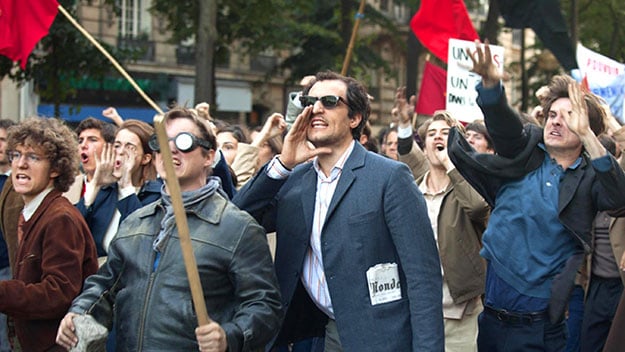
In a particularly intense rant, Jean-Luc talks about throwing out all of cinema—to the dustbins of history with Ford, Lang, Renoir, and Godard—and saving only some subversive comedy, including the Marx Brothers, Jerry Lewis, and Laurel and Hardy. Hazanavicius seems to run with this program by making a militantly Tashlino-Marxian film, in which everything is material for a gag—particularly the sort of cinephile in-joke that The Artist so joyously reveled in. The fourth wall is frequently razed with a wrecking ball: we get Garrel as Jean-Luc, complaining about the stupidity of actors, then commenting, “If you tell one to say actors are dumb, he’ll do it.” There’s also a scene in which both Garrel and Martin appear proudly naked, as Jean-Luc wonders why directors have this thing about making actors undress.
As pastiche, Godard Mon Amour is a pleasure, however obvious the gags sometimes are. DP Guillaume Schiffman and production designer Christian Marti (Hazanavicius and Anne-Sophie Bion share editing credits) neatly capture the vivid new styles explored in the ’60s by Godard and cinematographer Raoul Coutard, especially when it comes to prime colors, riffing both on the French flag and on the palette of Mondrian’s paintings. The film also recreates the cultural “furniture” of the period, including those bra ads that ’60s Godard was so fond of, and Situationist and other slogans on the Paris walls.
There’s a lot to enjoy in Godard Mon Amour as long as you don’t take it seriously. As soon as you let yourself take it seriously at all, it begins to looks a little ugly; Hazanavicius isn’t quite smart enough to take the measure of his own facetiousness. He lurches uncomfortably from light, knowing farce: when there’s a moment of real emotional drama towards the end, simply moving into slow motion doesn’t do the trick. There’s also a horrible moment of disjuncture in a lengthy sequence that reconstructs the violence of May ’68, the paving stones flying and the baton charges of the police—all set to a breezy contemporary jazz-pop waltz.
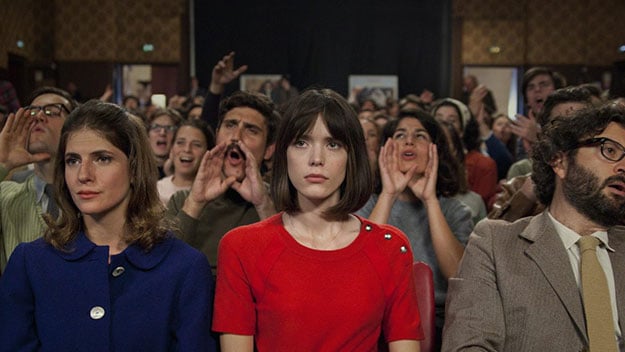
One of the traumas of modern French history is a generation’s feeling that, after a brief moment in which a rip had been torn in familiar reality, offering a glimpse of a radically different possible world, after May ’68 everything returned—for better or worse—to “normal,” both in politics and in cinema. Fifty years of that new “Restoration,” you might call it, has made it possible for a film like Godard Mon Amour to exist, in which Godard’s cinema and the events of 1968 are treated a little bit seriously, a little bit comically, indeed fondly, but not too seriously, quand même. In that respect, Godard Mon Amour’s treatment of political and cultural history looks absolutely ancien régime. Hazanavicius is certainly adept at taking what were once radical new turns of film language and making them merely retro chic: du lifestyle, quoi. But you also sense that he’s absolutely with the people who dig Godard’s “early, funny ones” and views the director’s turn to increasingly abstract philosophical and formal inquiry as some sort of neurotic collapse, even personal sellout: as, apparently, does Anne in the film.
But where is Wiazemsky in all this? On the sidelines. The worst thing about Godard Mon Amour is that it reduces Anne to an indulgent, amused, then somewhat impatient observer of her own story: Hazanavicius is not that interested in what it must have been like for her to live with an older man with a huge tormented ego in this period. The film just gives us glimpses of her as a long-suffering consort who had to put up with being ignored at parties while the men talk politics. The nearest we get into Anne’s feelings is the film’s crassest moment: Jean-Luc is dismayed that a Ferreri shoot will take her away for two months, but she gives a knowing “Phew!” look. Stacy Martin takes this all in good spirit, and gives a performance that’s lively, brisk and charming—although lively, brisk and charming is pretty much all she’s required to be.
As for Bérénice Béjo—Hazanavicius’s partner, and his muse in The Artist—she plays a friend of the couple, but we’re not even informed that she’s the clothes designer turned filmmaker Michèle Rosier. She seems there purely as confidante to motivate a few personal comments from Anne, and as a sort of chaperone to Martin (yes, Hazanavicius is constantly eyeing up the actress’s bottom, but it’s OK, his wife is present). The film depicts a largely male world, and yes, is offering something of a wry critique of how the ’60s Left marginalized women. But the film is based on Anne Wiazemsky’s book, and there’s nothing of Wiazemsky here (Martin doesn’t remotely look like her, more like Jane Birkin, and is styled as a generic version of the jeune fille des années 60, as much Carnaby Street as Boulevard St. Germain).
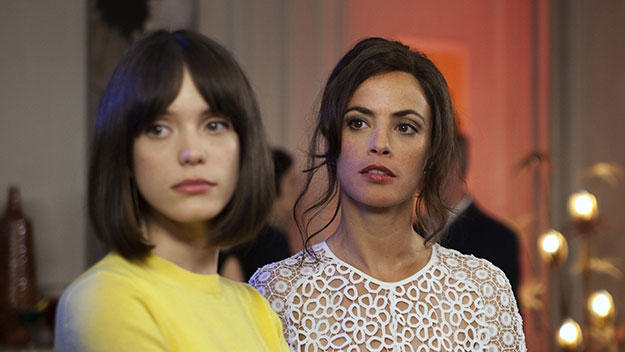
What makes Godard Mon Amour enduringly enjoyable on a second viewing is Louis Garrel’s charming, surprisingly touching performance. Garrel has become something of an irritant in French cinema with his air of stormy-browed narcissism, yet here he shows a deliciously well-turned comic grace. He catches the singular Godard diction—including a speech impediment that makes him “zézaye,” as the French word goes, saying zeune for jeune—and gives Jean-Luc a soft-spoken dignity even when he’s being most clownish or obnoxious.
In a way, Godard Mon Amour takes the Gorinist position with regard to icons: just because Godard currently enjoys an almost godlike status transcending the usual prestige of cinema’s grand old men, that doesn’t mean that he can’t have the wind knocked out of his sails. In a way, Godard Mon Amour is of a piece with the recent French novel The Seventh Function of Language, in which Laurent Binet sent up the gods of the Structuralist and post-Structuralist revolution with a mock mystery thriller about the death of Roland Barthes; he could do so because he was steeped in Structuralist language and debate. Similarly, you have to love Godard, however selectively, to have made Godard Mon Amour. Even so, even an avowed iconoclast might think that Hazanavicius can sometimes be a little too intrusive. Jean-Luc surfacing from under the bedsheets to discuss boycotting Cannes—in mid-cunnilingus? A stupid, stupid idea.
Jonathan Romney is a contributing editor to Film Comment and writes its Film of the Week column. He is a member of the London Film Critics Circle.







